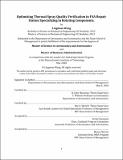Optimizing thermal spray quality verification in FAA repair station specializing in rotating components
Author(s)
Wang, Lingmiao.
Download1191225090-MIT.pdf (997.9Kb)
Other Contributors
Sloan School of Management.
Massachusetts Institute of Technology. Department of Aeronautics and Astronautics.
Leaders for Global Operations Program.
Advisor
R. John Hansman and Roy E. Welsch.
Terms of use
Metadata
Show full item recordAbstract
Thermal spray is a manufacturing process where melted particles are sprayed onto a surface to build up thickness. It is used extensively in the aerospace industry to improve and repair part surfaces, extending the useful life of expensive components. Because thermal spray is a special process, current quality practices require destructive testing. Because testing using production parts is expensive, quality management is commonly done through the use of representative test coupons. However, the coupon process is both financially expensive and operationally inefficient. Connecticut Rotating Parts (CTRP) is an FAA Part 145 repair station specializing in rotating hardware. Thermal spray is used at multiple stages during the repair process so the continued operation of its spray booths are critical to meeting delivery dates. Currently, CTRP runs weekly coupons for every material and spray booth combination. Each test cycle is at least 24 hours during which no parts can be sprayed. The objective of this thesis is to use CTRP as a benchmark to investigate thermal spray quality related issues in order to evaluate best practice quality control methods. Specifically, this project evaluated a camera system that monitors the state of the particles prior to substrate contact as an indirect measure of buildup quality. An analysis of CTRP's historical coupon and production performance showed very few failures. The failures that did occur were most likely the result of isolated deviations rather than systemic faults. Testing of the camera system was unable to conclusively establish the parameters needed for regular plume and equipment monitoring. These findings suggest that existing process controls are very capable of producing high quality coatings even in high turnover shops like CTRP and that weekly testing may be overly conservative. However, non-destructive testing methods do not yet exist that can sufficiently replace the utility of representative coupons.
Description
Thesis: M.B.A., Massachusetts Institute of Technology, Sloan School of Management, in conjunction with the Leaders for Global Operations Program at MIT, May, 2020 Thesis: S.M., Massachusetts Institute of Technology, Department of Aeronautics and Astronautics, in conjunction with the Leaders for Global Operations Program at MIT, May, 2020 Page 61 blank. Cataloged from the official PDF of thesis. Includes bibliographical references (pages 57-58).
Date issued
2020Department
Sloan School of Management; Massachusetts Institute of Technology. Department of Aeronautics and Astronautics; Leaders for Global Operations ProgramPublisher
Massachusetts Institute of Technology
Keywords
Sloan School of Management., Aeronautics and Astronautics., Leaders for Global Operations Program.